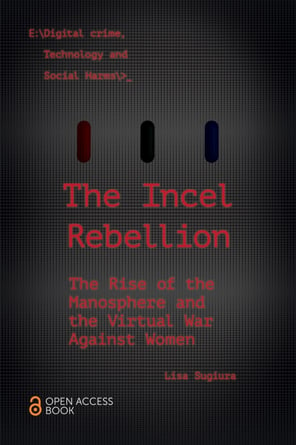- Home
- How you'll learn
- Blog
- Cybercrime expert Dr Lisa Sugiura examines The Incel Rebellion
Dr Sugiura's latest book takes a closer look at the incel community
Her research seeks to understand incel motivations and behaviours
Find out about Dr Lisa Sugiura's latest book, highlighting the harms that arise from misogynistic ideologies within the incel community.
This post is by Dr Lisa Sugiura, Course Leader for the University of Portsmouth's online MSc in Cybercrime. Her research focuses on online deviance and technology-facilitated gender-based abuse and sexual violence.
The incel community
As part of my broader research interests in gender and cybercrime, I have been studying the involuntary celibate (incel) community for over three years, and my book: The Incel Rebellion: The Rise of the Manosphere and the Virtual War Against Women published by Emerald on November 5th 2021, is the culmination of this work.
 I studied incels by spending time within incel forums and websites and conducted interviews with current and former self-identifying incels to understand their formation and culture.
I studied incels by spending time within incel forums and websites and conducted interviews with current and former self-identifying incels to understand their formation and culture.
The purpose of the research was to understand incel’s motivations and behaviours, as well as the evolution and spread of the incel community.
I wanted to highlight the harms arising from the misogynistic ideologies within incel and other groups online, which had been previously operating relatively undetected and often dismissed as minority fringe groups.
The aftermath of Plymouth
Incels are just sexually repressed men who hate women and are terrorists, right? In the aftermath of the abhorrent attacks committed in Plymouth, UK, law enforcement, the media, and the public were naturally struggling to make sense of why this happened.
It hadn’t been 24 hours since the shootings before videos made by the perpetrator had been discovered online. These videos depicted a troubled young man who likened himself to the involuntary celibate - community, in that he was lonely and depressed due in part, to his being a virgin.
Suddenly, the term incel was everywhere in the news media, drawing attention to this previously clandestine online subculture.
How cybercrime helps you understand emerging online harms
If you had been studying cybercrime though, you would have already been aware of the threats posed by incels and the broader manosphere, and the hate-fuelled posts readily accessible on online forums, social media, videos, and memes.
Moreover, you would have a nuanced understanding of the culture and dynamics of incels, far beyond that which has presented elsewhere. This is because studying cybercrime enables you to learn about and critically analyse emerging online behaviours and harms, which aren’t necessarily addressed in the mainstream.
Nowadays we are living our lives simultaneously on and offline through our use of digital technologies and so it is imperative that we understand how this is impacting upon criminal and offending behaviour and what the harms and future harms are that need responding to.
Technology isn’t going anywhere; it will continue to rapidly develop, and we need to study how it is being used in negative ways to protect people and help improve society.
A growing risk
Fears are mounting about incels radicalising people to extremist violence, but the situation is not as simple as incels being labelled terrorists or not. What my research has discovered, is that only a small minority of incels or those ascribing to the incel ideology mobilise to actual physical violence.
However, there are wider harms arising from the type of thinking within the incel community - not just externally against women and society, but internally, experienced by individuals within the community itself.
However, this does not discount how acts of extreme misogynistic violence can amount to terrorism, despite the reluctance from authorities to recognise it as so. Instead, such acts are presented as isolated incidents, rather than part of a wider pattern of extreme misogynistic violence.
There are significant risks to not only women, society and incels themselves, but also to Western democracy and progressiveness.
For too long there has been a reactive approach to misogyny, with terrible incidents such as high-profile murders of women, or incel-related attacks, evoking public interest in misogyny, however, the hatred of women has been able to flourish both on and offline, unabated, and often unchallenged.
Read our profile of Dr Lisa Sugiura to find out more about her cybercrime research and follow her on Twitter. Lisa's book, The Incel Rebellion: The Rise of the Manosphere and the Virtual War Against Women is published by Emerald on November 5th 2021.
Gain the skills needed to meet the demand for experienced cybercrime investigators with the University of Portsmouth's online MSc in Cyber Security and Digital Forensics. Choose from three start dates a year.
.png?width=180&height=222&name=UoP_Study%20Online_Stacked%20(1).png)

.png)



